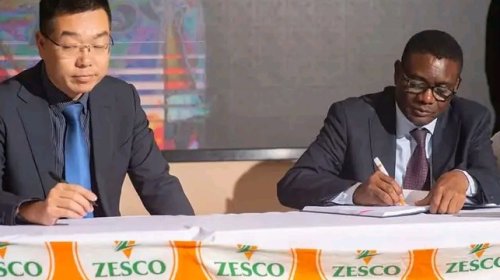Vacate the injunction earlier granted to Konkola Copper Mines (KCM) | CEC
THE Copperbelt Energy Corporation (CEC) has asked the Kitwe High Court to vacate the injunction it earlier granted Konkola Copper Mines (KCM) as it has been overtaken by events.
The Kitwe High Court last month granted an interim injunction to KCM, which restrained CEC from cutting power supply to the mining company until determination of the matter by the court.
CEC had threatened to restrict power supply to KCM in its bid to recover the over US$132 million that KCM owed the energy firm at the time, a move that prompted KCM to seek legal recourse.
When the matter came up for hearing before Justice Evaristo Pengele’s chambers, CEC lawyer William Nyirenda S.C submitted that the court should set aside the injunction because it had been overtaken by events.
Nyirenda submitted that the law governing injunctions clearly states that an applicant seeking relief needs to meet certain requirements and conditions.
He argued that KCM’s application for an injunction was premised on the Power Supply Agreement which had since expired thereby rendering the injunction unnecessary as there was no legal basis for the mining company to seek relief.
Niyrenda further argued that KCM had entered into another power supply agreement with Zesco thereby disallowing itself the right to a continuation of the injunction since the PSA which formed the basis for the injunction had expired.
Nyirenda said for an injunction to be sustained, the applicant must to show that they would suffer irreparable damage that could not be atoned for by damages and that KCM had not shown how they would suffer such damages.
He submitted that KCM’s claim that the restriction of power supply would cause damage to its facilities was untrue because there was a prescribed procedure agreed by the parties on how such a restriction would be undertaken.
He argued that CEC and KCM had disengaged and that there was no implied or express contractual relationship between the parties in relation to any power supply agreement.
“If the court is to grant a continuation of the injunction, it will essentially be extending or creating a new power supply agreement and the court has no authority to impose a contract on the parties,” Nyirenda submitted.
Another lawyer representing CEC, Musa Mwenye SC, said by seeking reliefs, KCM had breached the law of equity by seeking remedies while being in breach.
“The law of equity states that ‘He who comes to equity must come with clean hands’. There are many facts that are indisputable principally, that: KCM owes CEC well over USD132 million, which amount has been admitted by KCM. KCM has entered into arrangements for a new PSA with Zesco. KCM has not shown how or when it intends to settle the debt it owes to CEC. The above are all breaches; KCM is seeking remedies while being in breach. An applicant cannot come to Court with tainted hands and seek to be availed remedies in equity,” he argued.
Mwenye said in an application for injunctions, the court must consider the balance of inconvenience, explaining that the court must determine which party was likely to suffer the most inconvenience if the injunction was not granted.
He argued that in the matter before court, the balance of inconvenience lay heavily on CEC as it continues to provide full supplies of power to KCM at a huge cost while there was no longer a contract in place and no arrangements by which CEC could recover its costs, further stressing that allowing the injunction to continue would be doing great injustice to CEC.
Mwenye further asked the court to vacate the injunction because KCM commenced the proceedings under a wrong process (arbitration Act, 2000).
He explained that the High Court of Zambia Act Rules, require that an application of the nature initiated by KCM should be brought to Court by an Originating Summons under the format prescribed in the said Rules. He said contrary to the law, KCM had commenced its action under a Writ of Summons.
“The proceedings have therefore been commenced under a wrong court process. The law is that if an action is wrongly commenced, the Court has no jurisdiction to hear it or make a decision on the matter. Any decision that would be made by the Court in that regard would be invalid and such a judgment, a nullity,” he submitted.
He also said following a change in events since proceedings commenced, courts should not involve themselves in academic exercises by hearing such matters.
Mwenye said KCM was under liquidation and the purpose of liquidation is to convert property into cash and that the mining company cannot therefore claim that they would suffer irreparable damage if the injunction was not sustained because no damage can be occasioned to cash.
Earlier, KCM attempted to have the matter adjourned on account that one of the lawyers had a bereavement but the court could not hear the application because it was made by a law firm that was not on record representing KCM with Justice Everisto Pengele ordering that the case proceeds in the absence of KCM representatives.
Justice Pengele reserved ruling in the matter to July 31, 2020.





